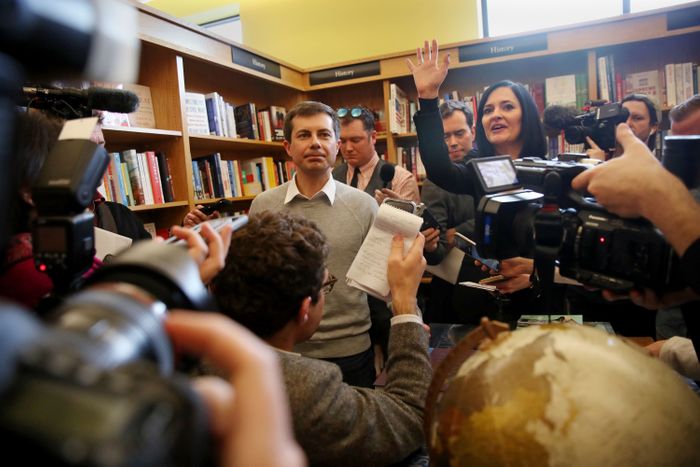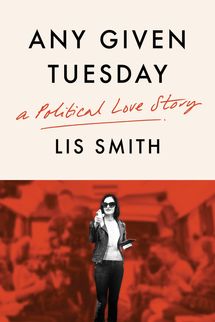
This article was featured in One Great Story, New York’s reading recommendation newsletter. Sign up here to get it nightly.
There’s nobody more fun to get spun by than Lis Smith. A hard-rockin’, quick-draw political operative who, in her own telling, loves “some good trench warfare” and “to roll around in the mud,” she became famous for making Mayor Pete semi-plausible as a presidential candidate. She has a sharp answer for everything, and an unnerving nerviness.
And yet … is she really tearing up when I ask her about working for Governor Cuomo during his auto-da-fé last year?
“It’s hard for me to talk about,” she said, clenching her teeth and a bottle of Bud Light last Friday night at Barrow’s Pub, a dive bar near her apartment in the West Village. We were there to discuss Any Given Tuesday: A Political Love Story, her new book out Tuesday, July 19, which ends with her time attempting to advise Cuomo on communications. Not that he was listening. She knew going in that the job was “notoriously an exercise in masochism,” and contends that she got played by Cuomo. “He’s someone I cared for, I loved, I trusted, I viewed as a mentor, a father figure, and it breaks my heart,” she said, lower lip quivering.
After the first blush of accusations against Cuomo, she’d stuck around because he swore he’d merely been “stupid” and that nothing else would emerge. The ground kept shifting as more women came forward. As Smith writes, “America’s governor was quickly turning into America’s asshole.” The eventual attorney general’s report on his sleazy behavior was the coup de Cuomo.
Smith said it pains her to think of “the collateral damage of his actions, all the people who lost their jobs and had their reputation ruined. Frankly, I’m not one of them.” But some of that mud did splash back on her, I pointed out. Texts between Cuomo aides that were published as part of the attorney general’s report showed Smith bragging about how she worked over reporters. (In other words: She got caught doing her job.) Read one entry: “I’m texting w Katy tur. Katy is saying my spin live. Like verbatim on CNN.” Tur, who actually works for MSNBC, was furious about that. “That was taken completely out of context and was completely unfair to her,” Smith protested. “She was talking to Cuomo sources and I was a Cuomo source. She did nothing wrong. She did something people do every day of the week. That is her job. I do feel bad about that.”
But Smith also had a spicy anecdote to drop: “In the last week or two of Cuomo’s governorship, when Cuomo was hemming and hawing and defying all his advisers about whether or not he should resign, Chris Christie confided in one of the advisers that he would personally get in his car and drive to Albany to get Andrew to resign.” (The two ex-govs are as tight as traffic on the GWB.)
Smith, 39, has advised races for governor’s mansions (Terry McAuliffe; Jon Corzine), the Senate (Claire McCaskill), and the White House (Barack Obama; Pete Buttigieg). She grew up in Bronxville, just outside the city, the daughter of two lawyers deeply enmeshed in politics. She was inspired by the The War Room, the documentary about Bill Clinton’s 1992 campaign that focuses on his strategists, James Carville and George Stephanopoulos. “That was, for me, why I wanted to get into this,” she said, “but let’s be real, it’s a very male movie.” That didn’t intimidate her much. Smith is comfortable in her own skin, drinking, smoking, swearing, and — when necessary — intimidating, all from behind her Gucci sunglasses, which she often wears inside for the same reason Anna Wintour is said to: so nobody can see what she is looking at.
Smith writes that a presidential campaign is “unpredictable. It’s not like tracking a menstrual cycle and knowing the window when you’ll be most fertile or the day you need to carry tampons in your purse.” (I bet Karl Rove has never thought of it quite that way.) Male political operatives, she said, “are deified for being rakish and cursing and drinking and women are expected to be, like, school marms.” Sitting there in her black tee shirt and cutoff jean short-shorts while queuing up Johnny Cash and Guns N’ Roses on the jukebox, Smith looked like the farthest thing from a school marm. She’s fun — something that is in exceedingly short supply in today’s Democratic Party.
She learned the strategic importance of fun from McAuliffe. “Republican leaders said the fact that he was relentless, the fact that he always invited them over for beers, made it easier for them to work with him,” she said. “We sometimes are perceived as the party of school monitors, but we don’t have to be, and there are a lot of people in our party who are not that way. I would say Joe Biden, especially, is not that way.”
Maybe so, but Biden isn’t exactly winning over many Americans these days. And he’s walled off the press. “Biden is not the slickest, sharpest talker on the block, but he never has been,” she said. “That was always his appeal as Obama’s running mate. I worked as the campaign’s director of rapid response in 2012, and there was a yin-yang dynamic. At times, it could be frustrating, because in my job, I’d always have to clean up when he’d say, ‘Good morning, Pennsylvania,’ when he was in Ohio, or talk about Governor Tom Kaine when he meant Tim Kaine, but that’s part of his regular-guy appeal. Most people don’t speak in perfectly formed sentences.” She said Biden should get out there and “talk to people every day, let them know you feel their pain, you’re on top of it, you’re listening to them, and care less about what the D.C. media is saying about your style, and whether you won the day or not.” Perhaps she should go work for the White House. Somniferous Biden could use a doubleshot, and there are job openings, after all.
Her passion for politics is clear, and sometimes, at least according to her book, this can get blurred into her feelings for the politicians too. When John Edwards first lost in 2004, she wrote about how she “sobbed uncontrollably. Edwards was my first political love. When his campaign ended, it hurt as badly as my first breakup.” At Dartmouth, she dated her professor, Jeff Smith, and then moved with him to Missouri when he ran for state senate. “I’d always been a little boy crazy,” Smith writes. After Eliot Spitzer resigned as governor, busted in a prostitution scandal, he ran for city comptroller in a splashy attempted comeback bid in 2013 and hired Smith. She fell hard, writing, “I was a goner the second I agreed to consult for him.”
Their relationship became tabloid dynamite. The New York Post staked out her apartment, her parents’ house, and tracked the couple to Jamaica. It’s clear the scrutiny took its toll. She writes about developing insomnia, paranoia, picking up a Klonopin prescription and losing, for a while, her sense of self-confidence. After years spent shaping press for others, seeing herself slinking across the cover of the tabs was like looking into a funhouse mirror. “Every scandal needs its archetypal characters, and the role I’d been cast in was that of the conniving whore,” she writes. Particularly acute was the agony of explaining it all to her family: “Trust me — no dad or brother ever wants to hear the words, ‘I’m in love with Eliot Spitzer.’”
De Blasio, for whom she was a chief spokeswoman when he ran for mayor in 2013, fired her after news of her relationship with Spitzer became public. And she’s not forgiven him. She writes about the rising panic she felt when she first interviewed with de Blasio, realizing that “the likely incoming mayor of New York was childish, intellectually lazy, overconfident in his own abilities, and annoyingly condescending.” She describes him spewing pseudo-intellectualisms while sipping Chianti, his teeth stained purple. “I basically blacked out for the next ten minutes as he talked about everything from Fiorello La Guardia to Buddhism,” she writes, comparing him to the “gross unshowered guy in college who showed up to Philosophy 101 and hogged ten minutes of class time to yell about the necessity of seizing the means of production.” Smith writes how “disingenuous” her firing was, given that a top de Blasio aide — the incoming head of New York City’s Department of Investigation — had been emailing Spitzer repeatedly, begging for his support, writing in one email that “Bill and I were both wondering if you would be open to getting involved.”
“I can see why de Blasio was pissed,” writes Smith. “Both of us had tried to get in bed with Eliot, but only one of us had been successful.”
None of which aligns with how most politicians, or even their operatives, talk these days. But again, she’s no school marm. Post Me Too, workplace entanglements are verboten. But she has only so much patience for that. “My parents met at the workplace, when my dad was in a position of power over my mom,” Smith shrugged. “I dated my college professor. I dated a candidate I consulted for. In my case, I didn’t feel like there were any power dynamics, but I fully understand that other circumstances might be different.”
The Killers’ “Mr. Brightside” began to play in the bar. “I wanted this to be Pete’s campaign anthem,” she said, “but our campaign lawyer said it had Me Too undertones. We went with ‘High Hopes.’”
She thinks Ron DeSantis could be a formidable 2024 contender. “To succeed in the Republican Party,” she said, “it’s not as much about ideological purity. Sometimes it’s more about how much you hate the people the Republican base hates. Christie got it, he hated public employees as much as the Republican base did. Trump hated immigrants as much as or more than the Republican base did. With DeSantis, it’s the experts, and he’s taken on the experts in the education field, the experts in the medical field. He combines it with a real working-class pedigree, and an Ivy League pedigree, and I think he’s figured out the right style, and the right Republican erogenous zones to hit with everything he does.”
The Democratic backbench appears to be nonexistent. “We’ve got to look outside D.C., because voters can smell D.C. on politicians,” said Smith. “I think the future is found a lot of times in states and cities.” She’s been helping out the Michigan Democrat Mallory McMorrow. She also cites as stars the Cincinnati mayor Aftab Pureval, Colin Allred of Texas, and Ritchie Torres in the Bronx.
Does she worry this book she’s written might torch future job prospects? “Sure, there are people who won’t hire me after reading it,” said Smith. “The decision I made was that, I don’t give a fuck. If you think I’m good at what I do, you’ll hire me. If this bothers you, then you weren’t worth my time anyway.”































